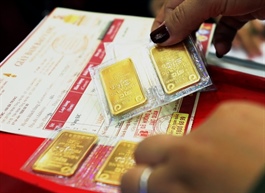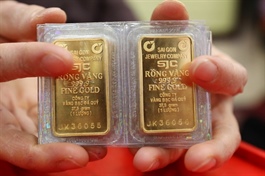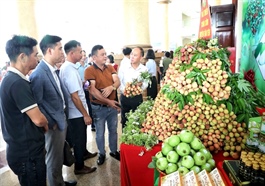Gold market structure needs to fundamentally change
Gold market structure needs to fundamentally change
Many experts believe that in order to sustainably stabilise the domestic gold market, it is necessary to realise the requirement of eliminating the monopoly of gold bars, as directed recently by the General Secretary Tô Lâm.

Gold jewellery at the Bảo Tín Mạnh Hải gold company. — VNA/VNS Photo Trần Việt |
It is time to fundamentally change the gold market structure through eliminating the monopoly and building a gold trading exchange to effectively manage the market, experts said.
Many experts believe that in order to sustainably stabilise the domestic gold market, it is necessary to realise the requirement of eliminating the monopoly of gold bars, as directed recently by the General Secretary Tô Lâm.
Only when more businesses are allowed to participate in the production and import of gold bars legally and transparently, can the market achieve a state of healthy competition, bringing domestic gold prices closer to world prices.
Talking about the goal of narrowing the gap between domestic and world gold prices, Vice President of the Vietnam Gold Business Association Nguyễn Thế Hùng said that this depends entirely on actual supply and demand in the market. In principle, when demand exceeds supply, prices will increase, and gold is no exception. If the local gold supply is supplemented, domestic gold prices will decrease.
According to Hùng, a major bottleneck at present are the activities of gold jewellery manufacturing enterprises. Although Decree 24/2012 allows the import of raw gold, gold manufacturing and trading enterprises have not been granted import quotas for more than ten years. As a result, they have to buy gold on the market unofficially at high prices with unknown origin. It means the ultimate risk will be pushed to consumers because they will have to buy gold at prices much higher than the world price.
Another bottleneck of the gold market is the 1 per cent export tax currently applied to jewellery. Vietnamese businesses import raw gold at global prices but are taxed when exporting, making the cost even higher. Therefore, they cannot compete against their foreign rivals. Meanwhile, they also have to bear a series of additional costs such as labour, machinery and depreciation.
Hùng believes if the export tax is removed and the supply of raw gold is ensured, it will create a strong driver for jewellery gold exports, attracting foreign currency revenues into the country.
According to deputy Trần Anh Tuấn of the National Assembly delegation of HCM City, if the Government shifts to market-based management and create conditions for qualified enterprises to participate in the production, trading and distribution of gold as a normal commodity, the gap between domestic and global gold prices will be narrowed.
“It is necessary to open the door to qualified enterprises. If they have a licence, they should be allowed to import according to their actual capacity. When supply increases sharply, the market will have more options. At that time, domestic gold prices will gradually approach world prices, which will contribute to stabilising gold price and limiting gold smuggling across the border,” Tuấn said.
Tuấn added that it is necessary to gradually remove barriers for domestic gold bar production. The current mechanism of designating a few enterprises to exclusively produce gold bars should not continue, but it should be expanded to all companies which meet the conditions.
According to Tuấn, the State still maintains a controlling role through general regulations and a strict monitoring technology system from input to output. However, besides the control, it is also necessary to create conditions for gold bars to circulate as a normal commodity in the market. When the supply is abundant and the market operates smoothly, measures of price control, speculation restriction and macro-economic stability will prove to be much more effective.
- 07:55 02/06/2025
























